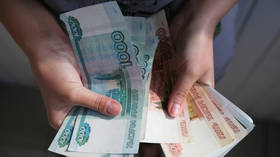Russia reports largest income growth in nearly a decade

Russians have seen their real incomes rise by the largest amount in eight years, with the growth in salaries outstripping the fall in earnings that occurred in 2020 during the first year of the Covid-19 pandemic, a new government report has outlined.
Rosstat, the Federal State Statistics Service, released the findings this week, showing that incomes rose by 3.1%, more than the 2.5% the government predicted in October. The largest growth occurred during the fourth quarter of the year.
The rise is the biggest since 2013, when earnings went up 4%. However, the government used a slightly different methodology for calculating incomes prior to 2014, so they caution that the numbers cannot be perfectly compared side by side.
Rosstat also determined that incomes had dropped 2% in 2020, not 2.8% as had been previously reported, meaning that they have now risen about 1% compared to pre-pandemic levels.
Alexey Vedev, a researcher at the Russian Presidential Academy of National Economy and Public Administration, told business daily RBK that real income growth of 3.1% was a very good result considering that inflation in 2021 had totaled 8.4%. He said that consumer spending picked up over the course of the year as the economy opened up in the wake of pandemic lockdown measures, but that this had begun to stabilize and growth would likely not be as high in 2022.
As inflation rose last year, the price of groceries went up dramatically, sparking fears that lower-income Russians would struggle to afford basic necessities. In November, the Central Bank called for immediate action to reduce costs, and the government created export quotas intended to increase the availability of domestically produced goods.
Real income is defined as people’s earnings, minus mandatory payments such as taxes and credit interest, adjusted for inflation.
However, like in many former Soviet nations, Russian financial statistic numbers don’t take into account the country’s sizeable black and gray economies, making the true picture far harder to determine. Many businesses continue to pay workers, as well as buy goods and supplies, in cash without declaring it to the authorities. One Swedish-backed study estimated the off-the-books share of the Russian economy at a whopping 45% in 2018. This number would make Russia Europe’s largest real economy, in terms of purchasing parity.
A separate poll released this week, conducted by research center A2 together with a local bank and insurance company, showed that 62% of Russians said they had no more than three months’ worth of savings in the bank. Some 58.5% of respondents reported they had a maximum of 100,000 rubles (about $1,340) saved, and 67% said they were afraid of losing money as a result of inflation or attacks by hackers and internet scammers.













